Contrary to popular belief, it is possible to have flowers and plants beautifying the chicken yard. I know this from experience as I have been Landscaping my chicken yard for years. My credentials? Thank you for asking. I am a fifth generation brown thumb gardener and homicidal horticulturist with a keen eye for the obvious and a fervent desire to outwit my chickens. If I can landscape my chicken yard absent any knowledge of proper landscaping or gardening practices- anyone can! I offer the following examples of gardening methods that have worked with my flock, but all are subject to being disproved by any given chicken at any time.
The first question I am always asked when discussing gardening in the chicken yard is, "which plants are toxic to chickens?" The short answer to that question is: I don't worry about it. Seriously. I do not select plants or flowers based on concerns about toxicity. Esteemed poultry expert Gail Damerow summed up the reason I don't worry about it best in The Chicken Encyclopedia:
"Whether or not a specific plant is toxic may vary with its stage of maturity, growing conditions (such as drought), and other environmental factors. Should a chicken get a potentially toxic dose, the outcome will depend on the bird's age and state of health. Since chickens peck a little here and a little there to get variety in their diet, a bite or two of a toxic leaf or seed is unlikely to create a problem. Most toxic plants don't taste good anyway and therefore are not tempting except to a chicken that has few other food choices. A house chicken, for instance, may be tempted to eat toxic houseplants of no other greens are available."
Damerow's position is supported by poultry veterinarian Julie Gauthier: "Scientists don't know much about the types and doses of plant toxins that affect free-range chickens. Fortunately, plant poisonings are very rare occurrences in chicken flocks…"
I say, worry more about your chickens, killing your plants than your plants killing the chickens!
Azalea in my chicken yard.
PERSONAL PHILOSOPHY
Before we began keeping chickens, our backyard was a hilly, wet, clay-ridden, mosquito infested space that we never used, so when the chickens arrived and eradicated the mosquito problem, the chicken yard became a space we could enjoy. I add landscape elements for us to enjoy, but if the chickens eat some of them, I don't get worked up about it. There would not have been any plants or flowers in that area but for the chickens anyway.
TRIAL & ERROR
The only way to know which plants and flowers are going to work in any given chicken yard is to experiment with different varieties. Trying to predict which plants or flowers your chickens might eat is completely pointless. Things my chickens eat, sit on, dig up or trample, others' chickens may not. Things my chickens ignored last year may be this year's favorite salad bar topping. There's just no predicting how landscaping will go from year to year with chickens.
Hostas are a good example- some years my chickens eat them like potato chips, other years, they don't touch them. There's no rhyme or reason to when or which varieties they will munch on, but they're perennials, so I don't worry about it- they'll grow back next year.
Baby Steps: I don't buy ten flats of something hoping that the chickens will leave it alone. I buy a few, see how it goes and if they're still alive in a few weeks, I'll plant more at that time.
PLANT SELECTION
Local garden centers, farms and nurseries carry plants that perform well in the growing zone they are located in, so I shop for my plants and flowers locally. Being a bargain hunter, I love shopping for perennials at the end of summer when prices are greatly reduced and the plants, nearly dead. I plant them immediately, knowing that they'll be back next spring.
I have had excellent luck with mint, vinca vines, sweet potato plants, ornamental grasses and spikes. For the most part, the chickens do not eat them and they are difficult to trample to death.
FOCUS ON HARD-TO-KILL VARIETIES
Without question my favorite plants for durability, hardiness, rate of growth, texture, color, shape and being generally chicken-proof are ornamental grasses. There is nothing my chickens or I have ever been able to kill them. They grow like weeds and provide color, texture, shade and interest to the chicken yard all year long. I hack them down to the ground every spring and they return in their full glory in no time. When the bases get too wide, we divide it with an ax. They require no attention, no water and a moderate amount of sunlight. The chickens can dig to China at the root balls yet they thrive. THAT is MY kind of plant!
Ornamental grasses lend beautiful texture, color and movement to the backyard most of the year.
USE CONTAINERS
Wherever possible, use container plantings in the chicken yard. Things planted in the ground are enormously tempting to dig up, but it's a little less convenient for chickens to uproot a potted plant- not impossible, just less convenient. I get a kick out of using creative containers in the chicken yard. The higher up I plant things, the less likely they are to be destroyed by my feathered wrecking crew.
Roof top planter, DIY instructions HERE.
Coop window flower box
Watering can
Galvanized tubs
Upcycled Ladder Planter, DIY instructions HERE.
Upcycled Tool Box.
EXPECT ROOSTING
Adding elements such as spikes or non-living adornments such as twigs discourages chickens from standing in or on the surrounding plants.
HIDE THE PERLITE/VERMICULITE
I have never met a chicken that did not love eating vermiculite and perlite. They will dig up the plant if they can see the little white specks, so I make a point of covering potting soil with vermiculite-free soil, leaves or mulch, and often, river rocks!
DISTRACTION
Invariably the flock will want to 'help' with planting. It's not that they are hoping to kill the plants immediately as much as it is that they appreciate someone priming the ground for a worm hunting expedition. I find it helpful to distract them by digging up some areas of soil away from where I'm planting to encourage them to occupy themselves elsewhere.
Sometimes it works, sometimes…not so much.
Bricks around the base of plants prevents chickens being able to scratch the surrounding soil.
HARDSCAPING
Freshly disturbed earth is very enticing to chickens and nothing is quite as upsetting as finding that the flock has uprooted a plant that I just planted. To deter unwanted excavation, I surround new plantings with pavers or rocks to give them a fighting chance. Works like a charm!
PRESERVATION
There are some areas in my chicken yard that I do not want redecorated for me. While we have mulch as far as the eye can see behind the chicken coops, invariably, my chickens would rather forage and dust bathe in the mulch adjacent to the grass, kicking it onto the grass. To deter this behavior and limit the amount of mulch I have to rake up and relocate nightly, I buried hardware cloth shallowly underneath the mulch in a few, select areas. I bend the edges of the wire down, which anchors it into the ground a bit and ensures that no sharp edges are exposed.
A FEW THOUGHTS ABOUT THE LAWN
I am often asked how my lawn remains lush in the face of 40 some marauding chickens. I really don't know for sure. I do know that throwing scratch or other treats onto the lawn is begging to have them tear it up. Do not toss treats out onto the grass- it only serves to encourage endless scratching.
It is possible to repair damaged areas of the lawn without re-seeding it or banishing the chickens to Siberia for the duration. The key is keeping the chickens off the nekked spots to allow the grass to re-grow. To do that, I toss a piece of chicken wire or hardware cloth on top of the bare spot and let it grow tall before removing the wire.
When all else fails, use non-living items to add color and interest to the chicken yard. Watering cans, galvanized steel pieces, a wagon wheels, a park bench, a rusty cultivator…the possibilities are endless.
Kathy Shea Mormino
Affectionately known internationally as The Chicken Chick®, Kathy Shea Mormino shares a fun-loving, informative style to raising backyard chickens. …Read on


shop my SPONSORS
Contrary to popular belief, it is possible to have flowers and plants beautifying the chicken yard. I know this from experience as I have been Landscaping my chicken yard for years. My credentials? Thank you for asking. I am a fifth generation brown thumb gardener and homicidal horticulturist with a keen eye for the obvious and a fervent desire to outwit my chickens. If I can landscape my chicken yard absent any knowledge of proper landscaping or gardening practices- anyone can! I offer the following examples of gardening methods that have worked with my flock, but all are subject to being disproved by any given chicken at any time.
The first question I am always asked when discussing gardening in the chicken yard is, "which plants are toxic to chickens?" The short answer to that question is: I don't worry about it. Seriously. I do not select plants or flowers based on concerns about toxicity. Esteemed poultry expert Gail Damerow summed up the reason I don't worry about it best in The Chicken Encyclopedia:
"Whether or not a specific plant is toxic may vary with its stage of maturity, growing conditions (such as drought), and other environmental factors. Should a chicken get a potentially toxic dose, the outcome will depend on the bird's age and state of health. Since chickens peck a little here and a little there to get variety in their diet, a bite or two of a toxic leaf or seed is unlikely to create a problem. Most toxic plants don't taste good anyway and therefore are not tempting except to a chicken that has few other food choices. A house chicken, for instance, may be tempted to eat toxic houseplants of no other greens are available."
Damerow's position is supported by poultry veterinarian Julie Gauthier: "Scientists don't know much about the types and doses of plant toxins that affect free-range chickens. Fortunately, plant poisonings are very rare occurrences in chicken flocks…"
I say, worry more about your chickens, killing your plants than your plants killing the chickens!
Azalea in my chicken yard.
PERSONAL PHILOSOPHY
Before we began keeping chickens, our backyard was a hilly, wet, clay-ridden, mosquito infested space that we never used, so when the chickens arrived and eradicated the mosquito problem, the chicken yard became a space we could enjoy. I add landscape elements for us to enjoy, but if the chickens eat some of them, I don't get worked up about it. There would not have been any plants or flowers in that area but for the chickens anyway.
TRIAL & ERROR
The only way to know which plants and flowers are going to work in any given chicken yard is to experiment with different varieties. Trying to predict which plants or flowers your chickens might eat is completely pointless. Things my chickens eat, sit on, dig up or trample, others' chickens may not. Things my chickens ignored last year may be this year's favorite salad bar topping. There's just no predicting how landscaping will go from year to year with chickens.
Hostas are a good example- some years my chickens eat them like potato chips, other years, they don't touch them. There's no rhyme or reason to when or which varieties they will munch on, but they're perennials, so I don't worry about it- they'll grow back next year.
Baby Steps: I don't buy ten flats of something hoping that the chickens will leave it alone. I buy a few, see how it goes and if they're still alive in a few weeks, I'll plant more at that time.
PLANT SELECTION
Local garden centers, farms and nurseries carry plants that perform well in the growing zone they are located in, so I shop for my plants and flowers locally. Being a bargain hunter, I love shopping for perennials at the end of summer when prices are greatly reduced and the plants, nearly dead. I plant them immediately, knowing that they'll be back next spring.
I have had excellent luck with mint, vinca vines, sweet potato plants, ornamental grasses and spikes. For the most part, the chickens do not eat them and they are difficult to trample to death.
FOCUS ON HARD-TO-KILL VARIETIES
Without question my favorite plants for durability, hardiness, rate of growth, texture, color, shape and being generally chicken-proof are ornamental grasses. There is nothing my chickens or I have ever been able to kill them. They grow like weeds and provide color, texture, shade and interest to the chicken yard all year long. I hack them down to the ground every spring and they return in their full glory in no time. When the bases get too wide, we divide it with an ax. They require no attention, no water and a moderate amount of sunlight. The chickens can dig to China at the root balls yet they thrive. THAT is MY kind of plant!
Ornamental grasses lend beautiful texture, color and movement to the backyard most of the year.
USE CONTAINERS
Wherever possible, use container plantings in the chicken yard. Things planted in the ground are enormously tempting to dig up, but it's a little less convenient for chickens to uproot a potted plant- not impossible, just less convenient. I get a kick out of using creative containers in the chicken yard. The higher up I plant things, the less likely they are to be destroyed by my feathered wrecking crew.
Roof top planter, DIY instructions HERE.
Coop window flower box
Watering can
Galvanized tubs
Upcycled Ladder Planter, DIY instructions HERE.
Upcycled Tool Box.
EXPECT ROOSTING
Adding elements such as spikes or non-living adornments such as twigs discourages chickens from standing in or on the surrounding plants.
HIDE THE PERLITE/VERMICULITE
I have never met a chicken that did not love eating vermiculite and perlite. They will dig up the plant if they can see the little white specks, so I make a point of covering potting soil with vermiculite-free soil, leaves or mulch, and often, river rocks!
DISTRACTION
Invariably the flock will want to 'help' with planting. It's not that they are hoping to kill the plants immediately as much as it is that they appreciate someone priming the ground for a worm hunting expedition. I find it helpful to distract them by digging up some areas of soil away from where I'm planting to encourage them to occupy themselves elsewhere.
Sometimes it works, sometimes…not so much.
Bricks around the base of plants prevents chickens being able to scratch the surrounding soil.
HARDSCAPING
Freshly disturbed earth is very enticing to chickens and nothing is quite as upsetting as finding that the flock has uprooted a plant that I just planted. To deter unwanted excavation, I surround new plantings with pavers or rocks to give them a fighting chance. Works like a charm!
PRESERVATION
There are some areas in my chicken yard that I do not want redecorated for me. While we have mulch as far as the eye can see behind the chicken coops, invariably, my chickens would rather forage and dust bathe in the mulch adjacent to the grass, kicking it onto the grass. To deter this behavior and limit the amount of mulch I have to rake up and relocate nightly, I buried hardware cloth shallowly underneath the mulch in a few, select areas. I bend the edges of the wire down, which anchors it into the ground a bit and ensures that no sharp edges are exposed.
A FEW THOUGHTS ABOUT THE LAWN
I am often asked how my lawn remains lush in the face of 40 some marauding chickens. I really don't know for sure. I do know that throwing scratch or other treats onto the lawn is begging to have them tear it up. Do not toss treats out onto the grass- it only serves to encourage endless scratching.
It is possible to repair damaged areas of the lawn without re-seeding it or banishing the chickens to Siberia for the duration. The key is keeping the chickens off the nekked spots to allow the grass to re-grow. To do that, I toss a piece of chicken wire or hardware cloth on top of the bare spot and let it grow tall before removing the wire.
When all else fails, use non-living items to add color and interest to the chicken yard. Watering cans, galvanized steel pieces, a wagon wheels, a park bench, a rusty cultivator…the possibilities are endless.



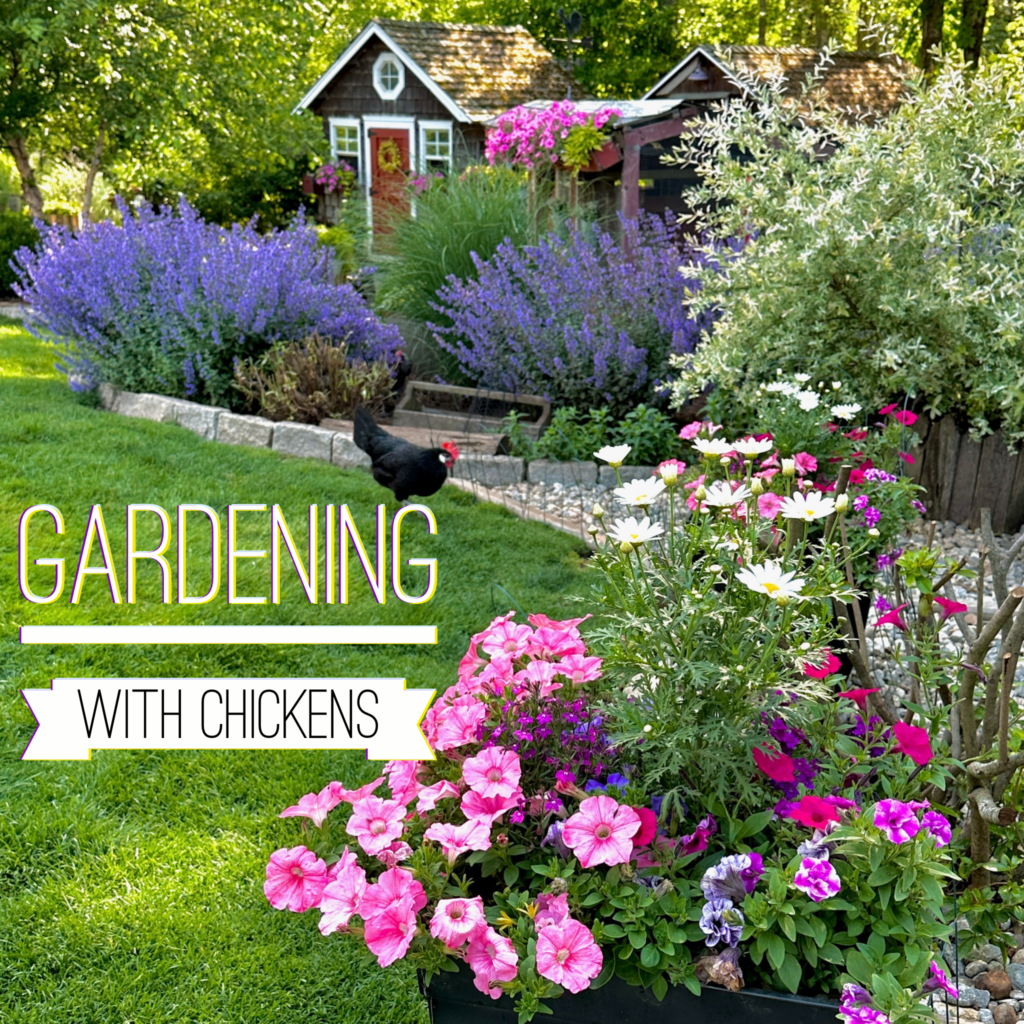


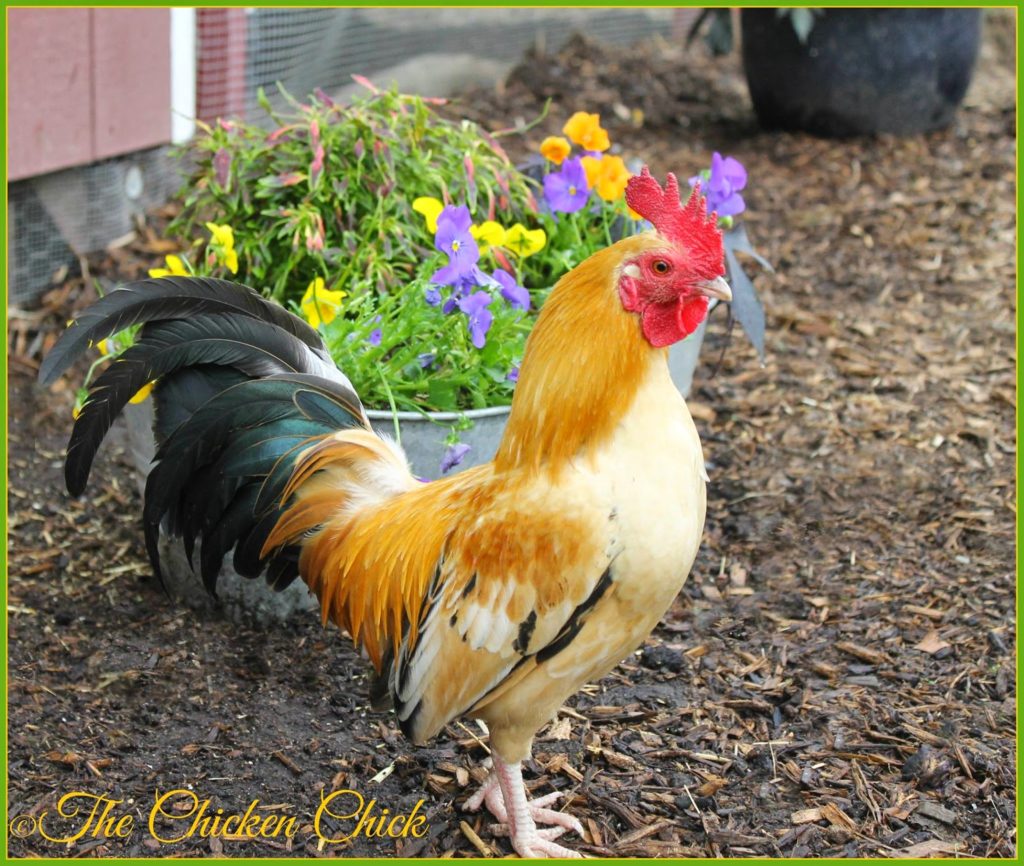

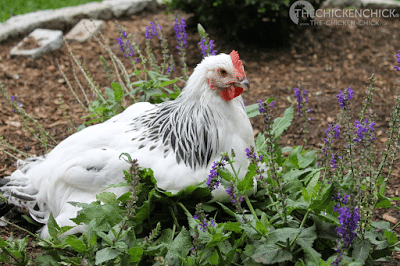

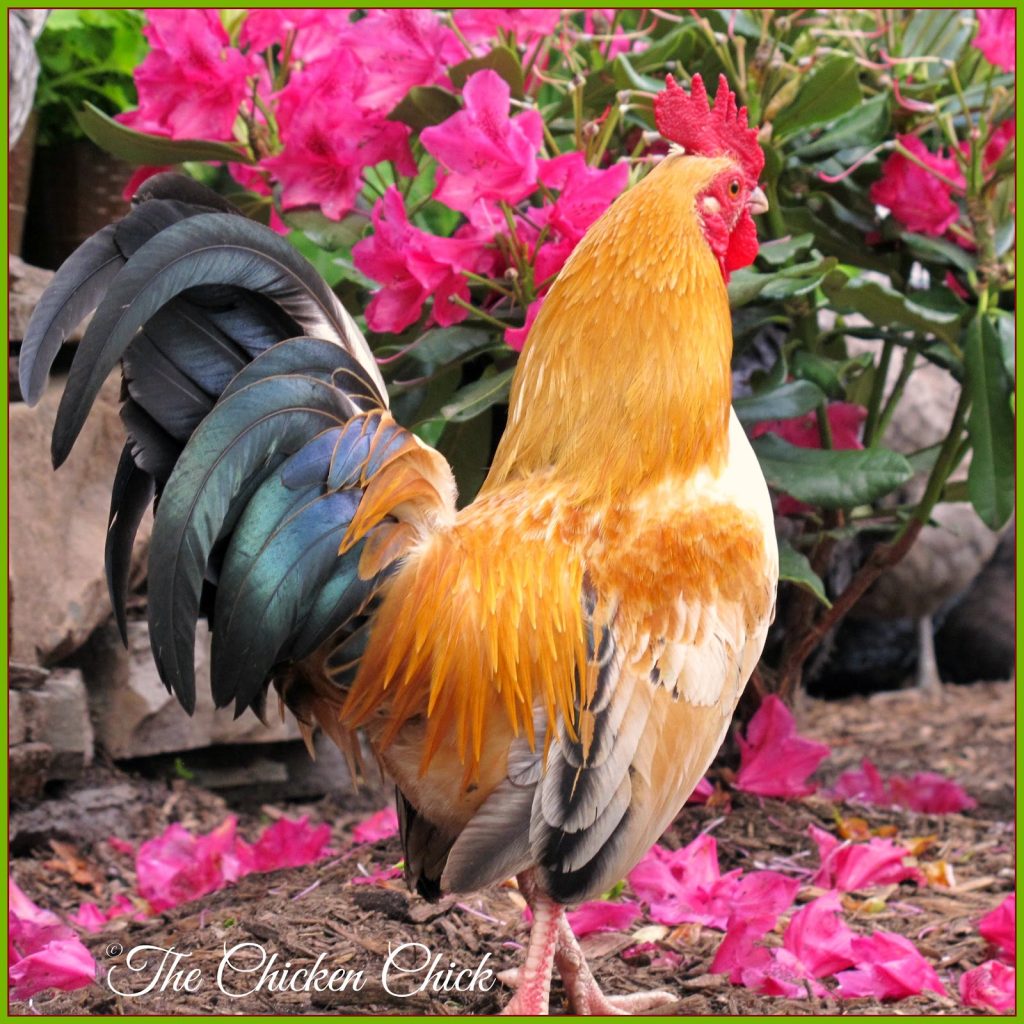
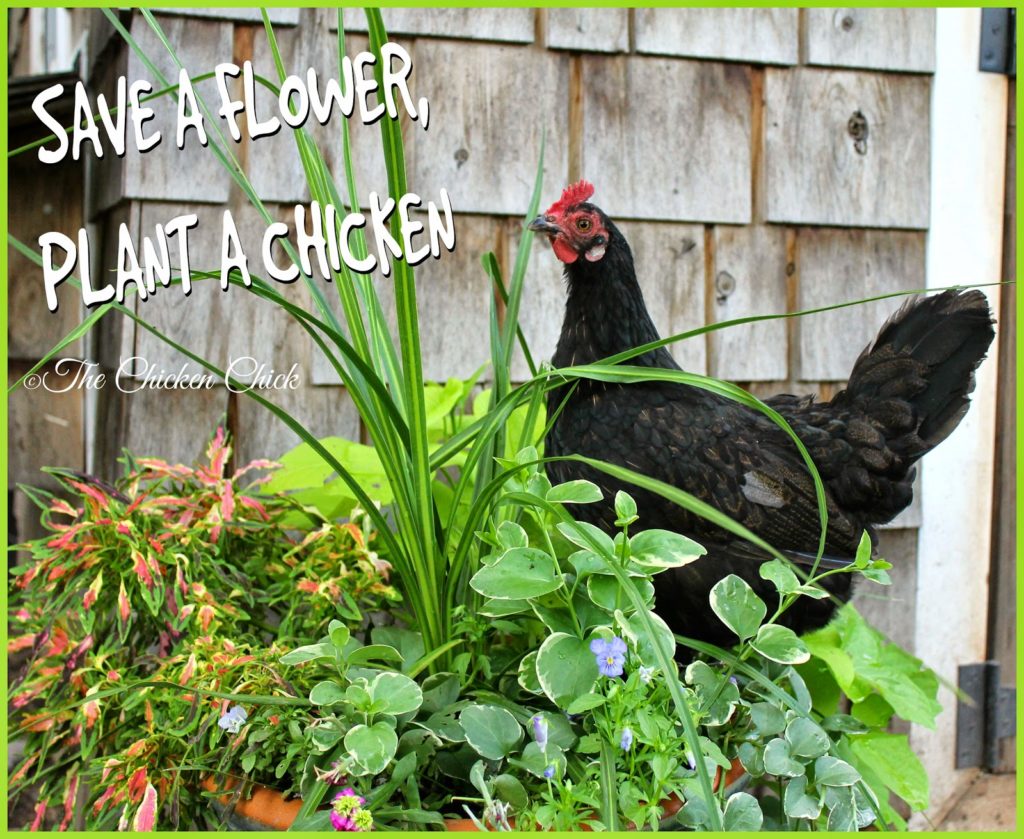


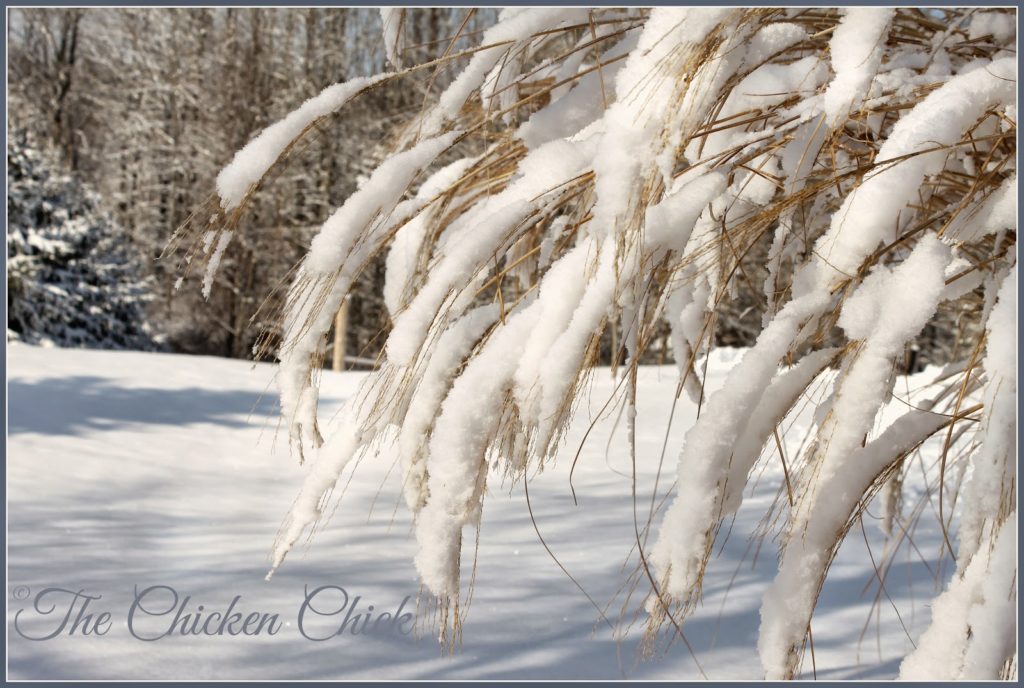
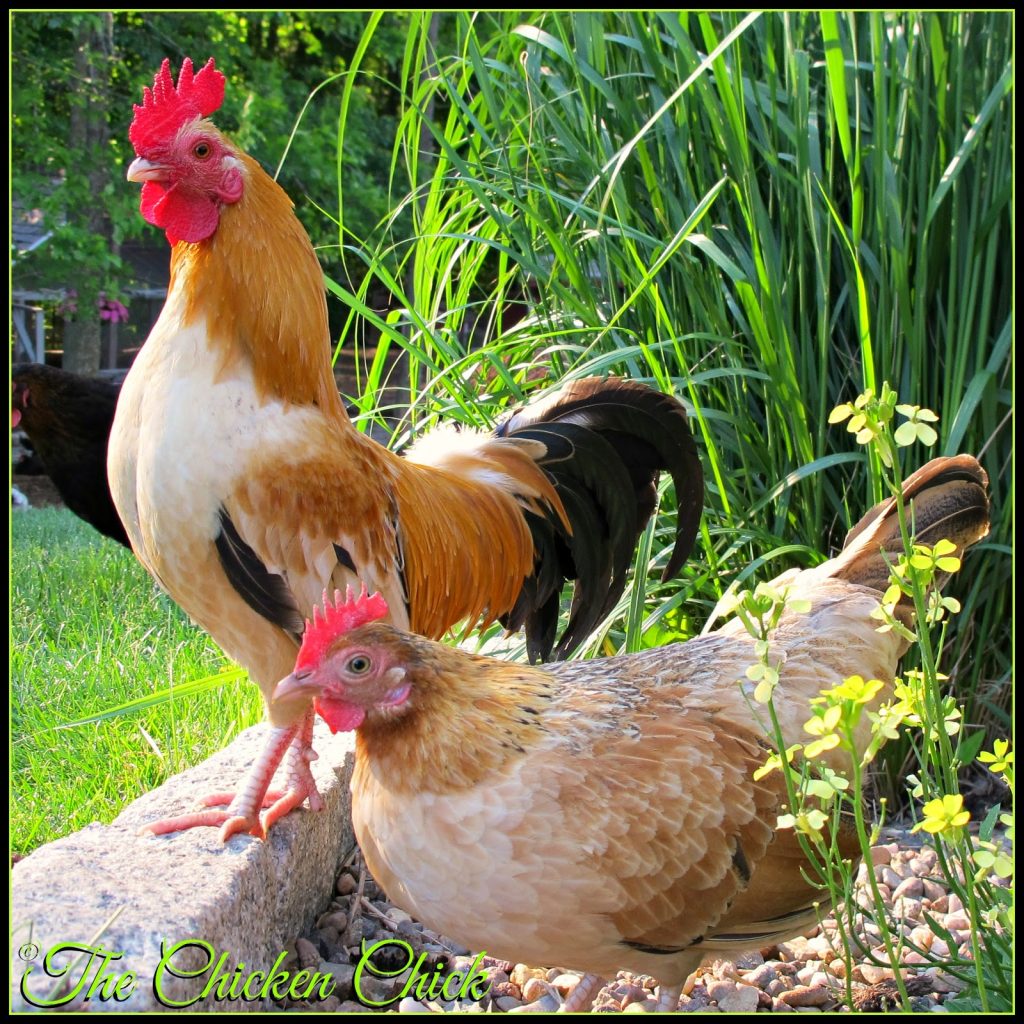





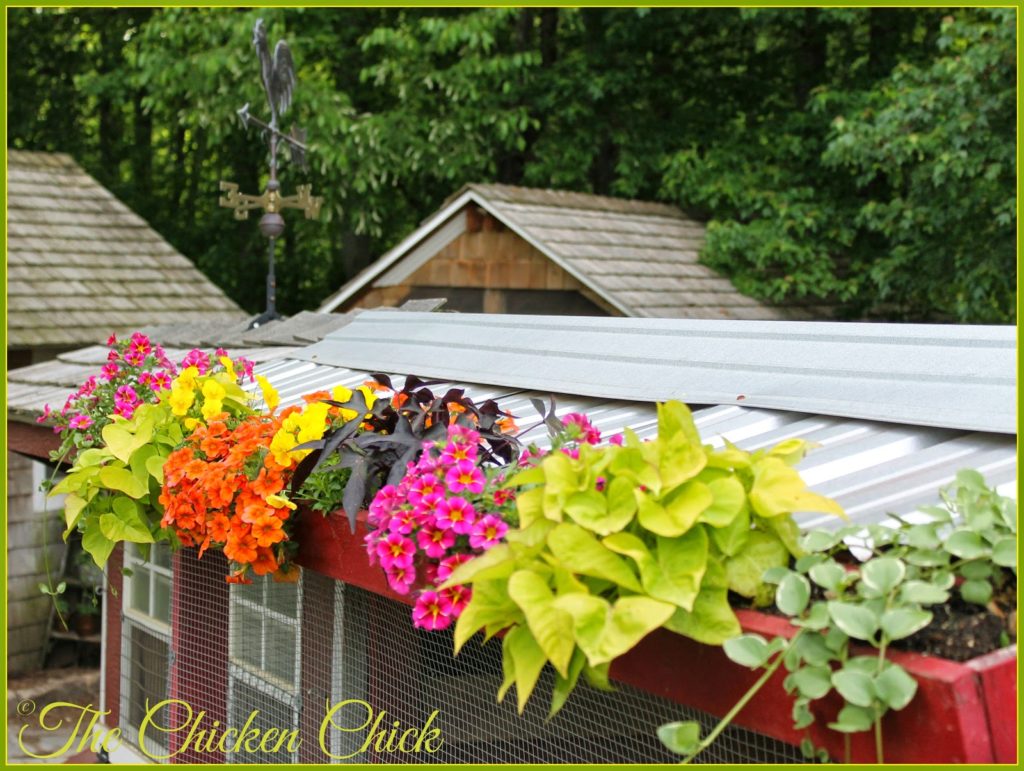


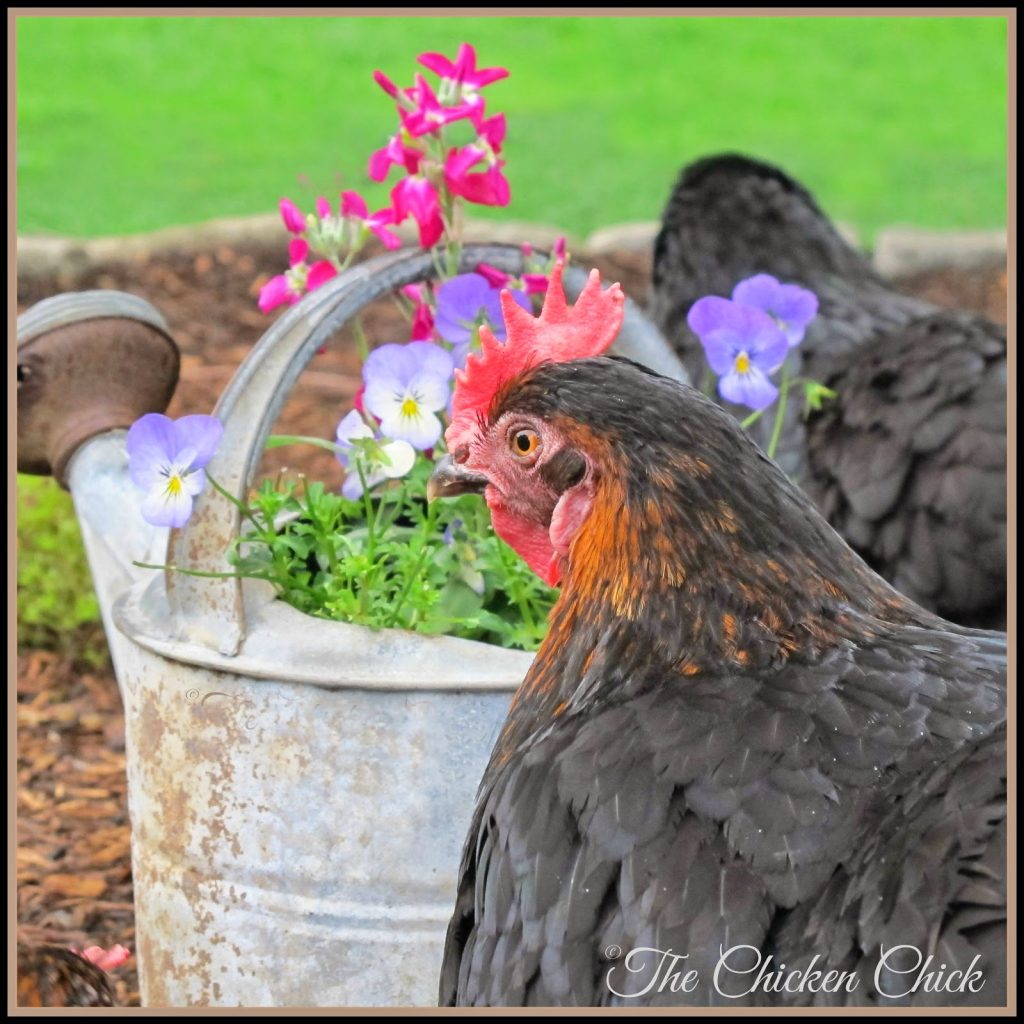
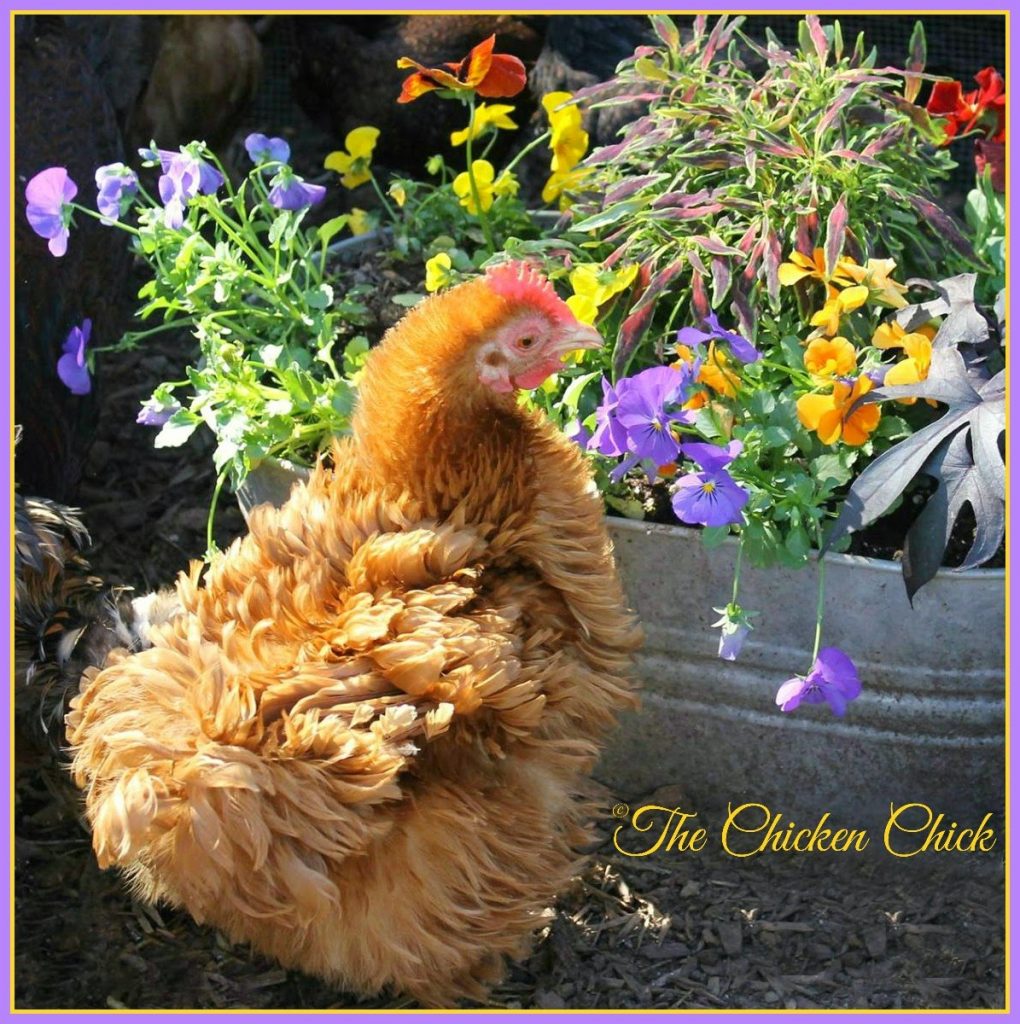

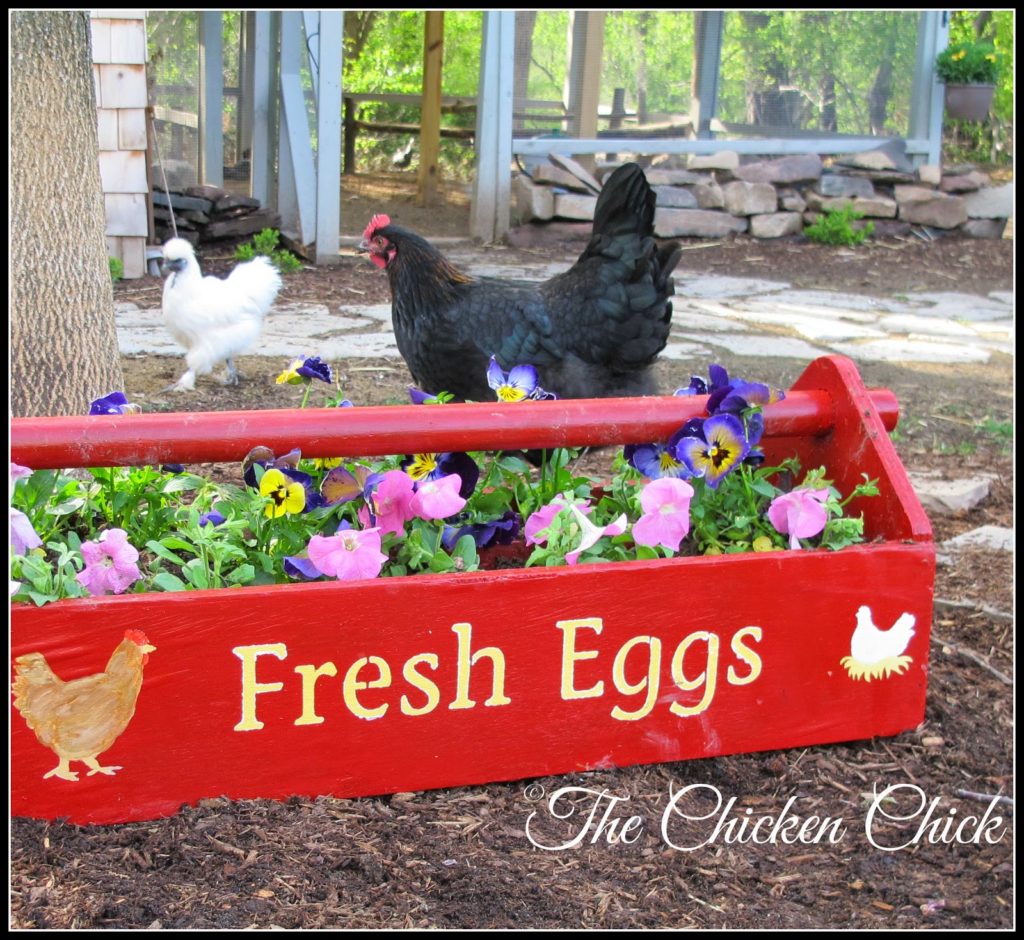
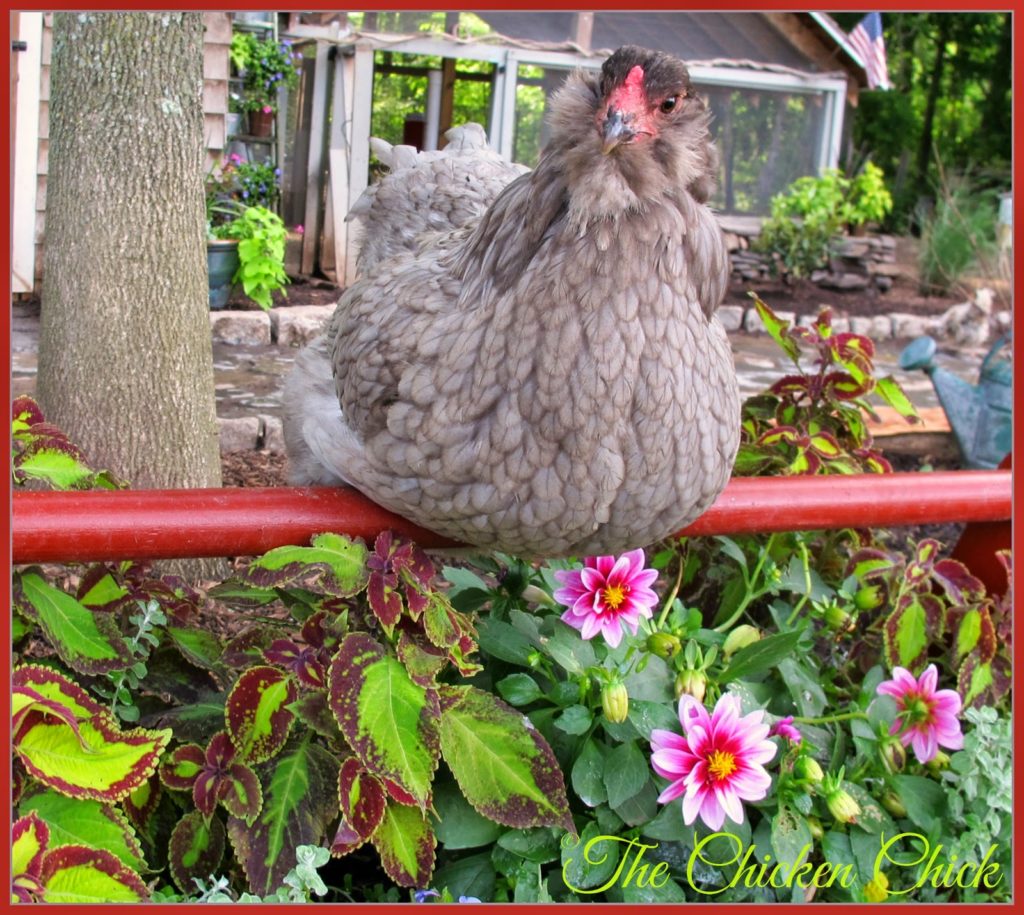
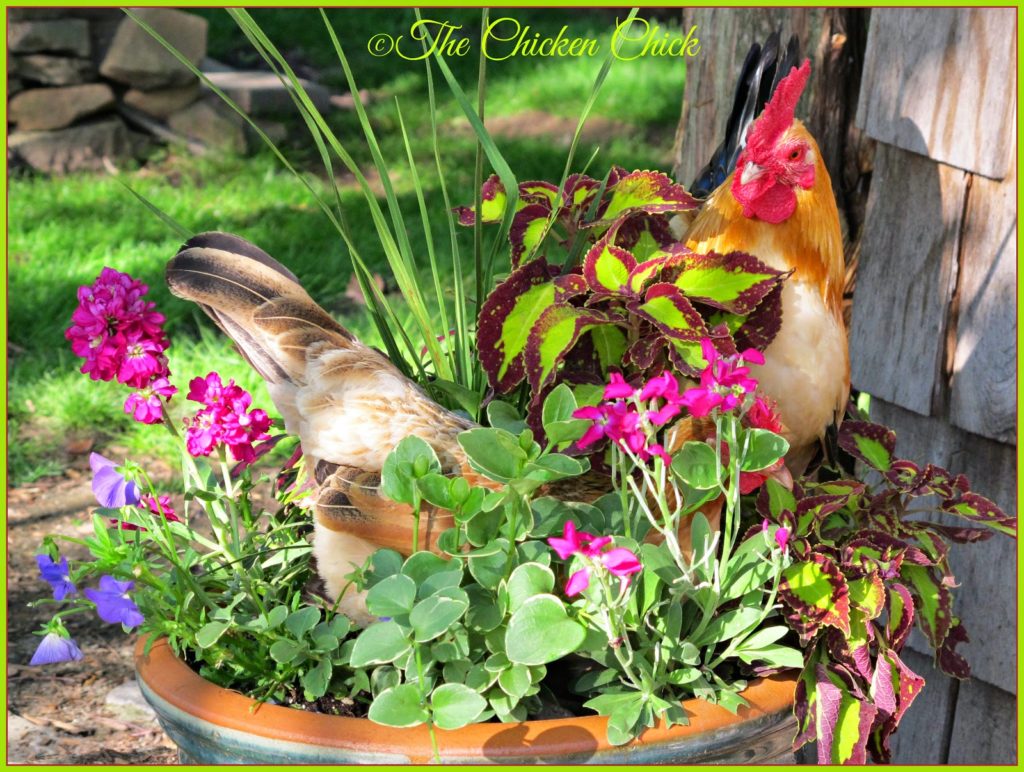

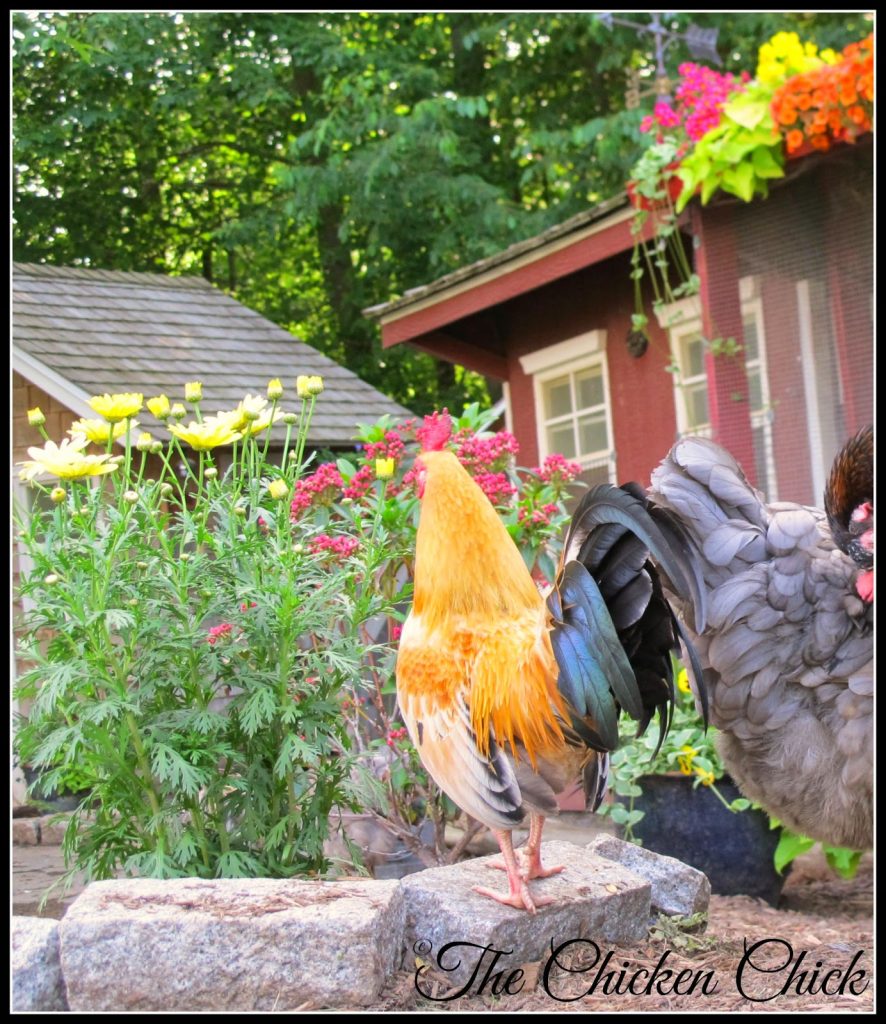
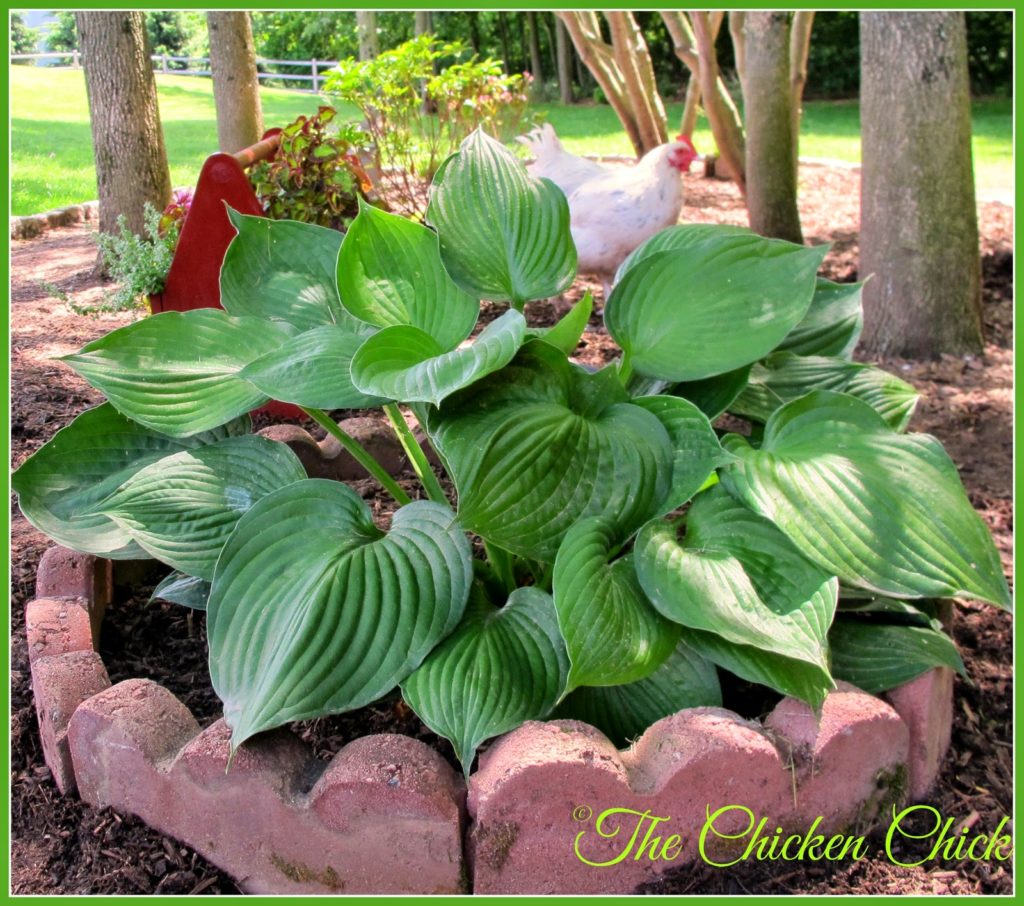
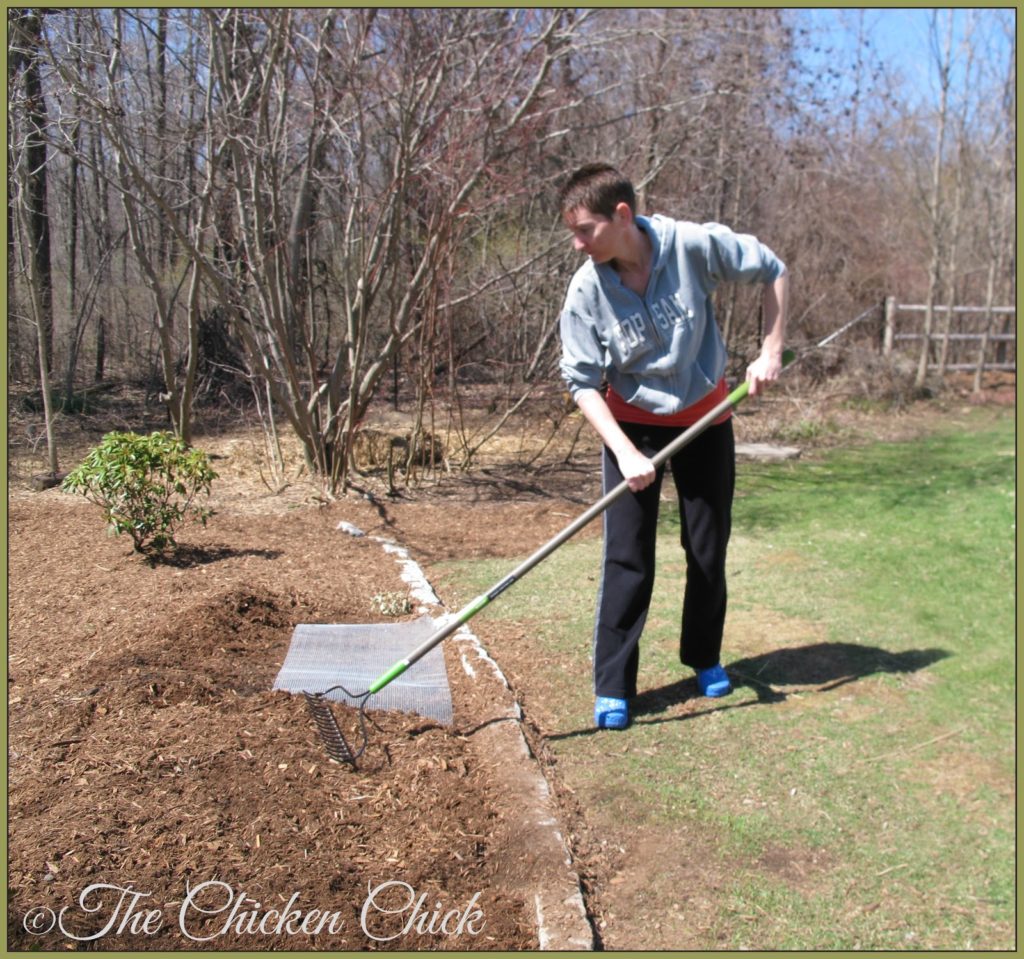

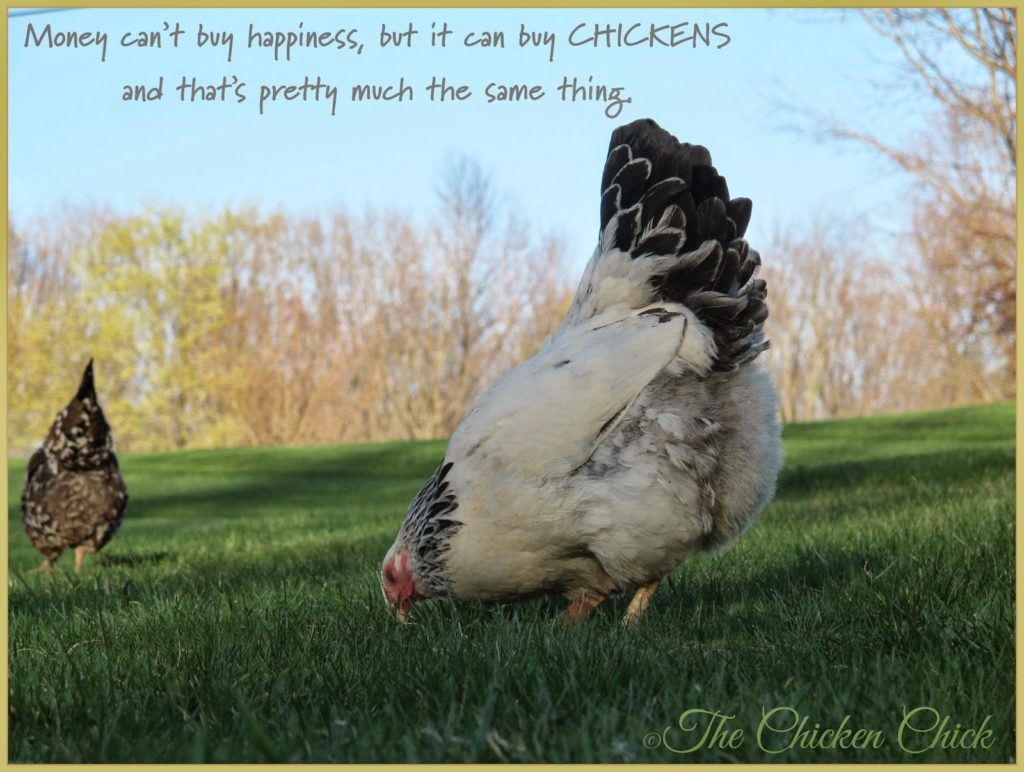

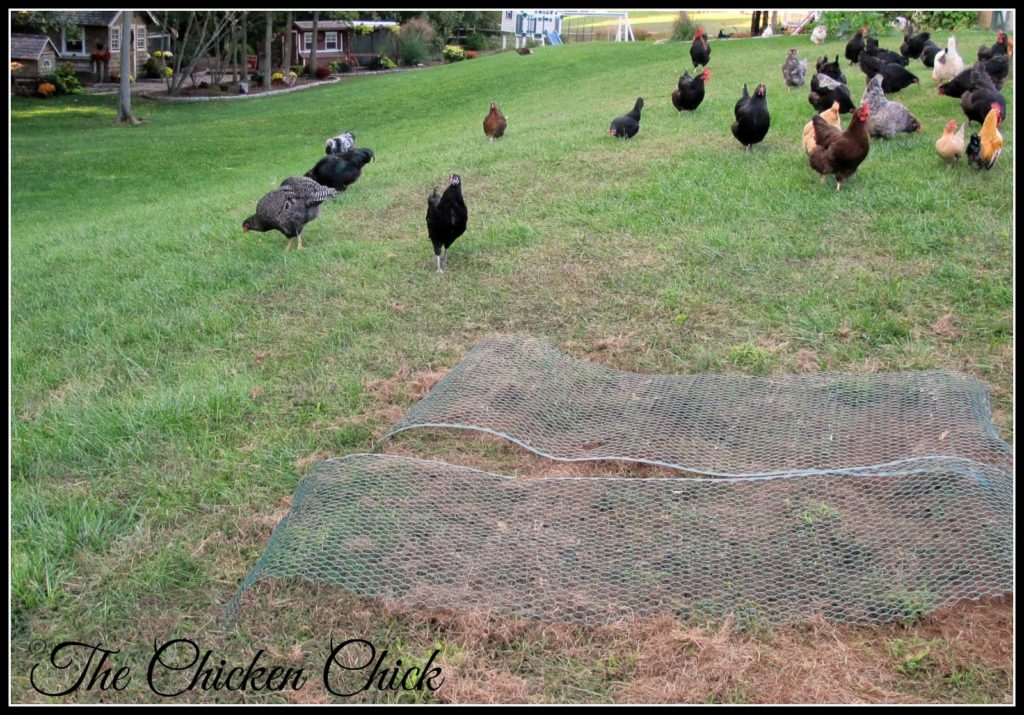
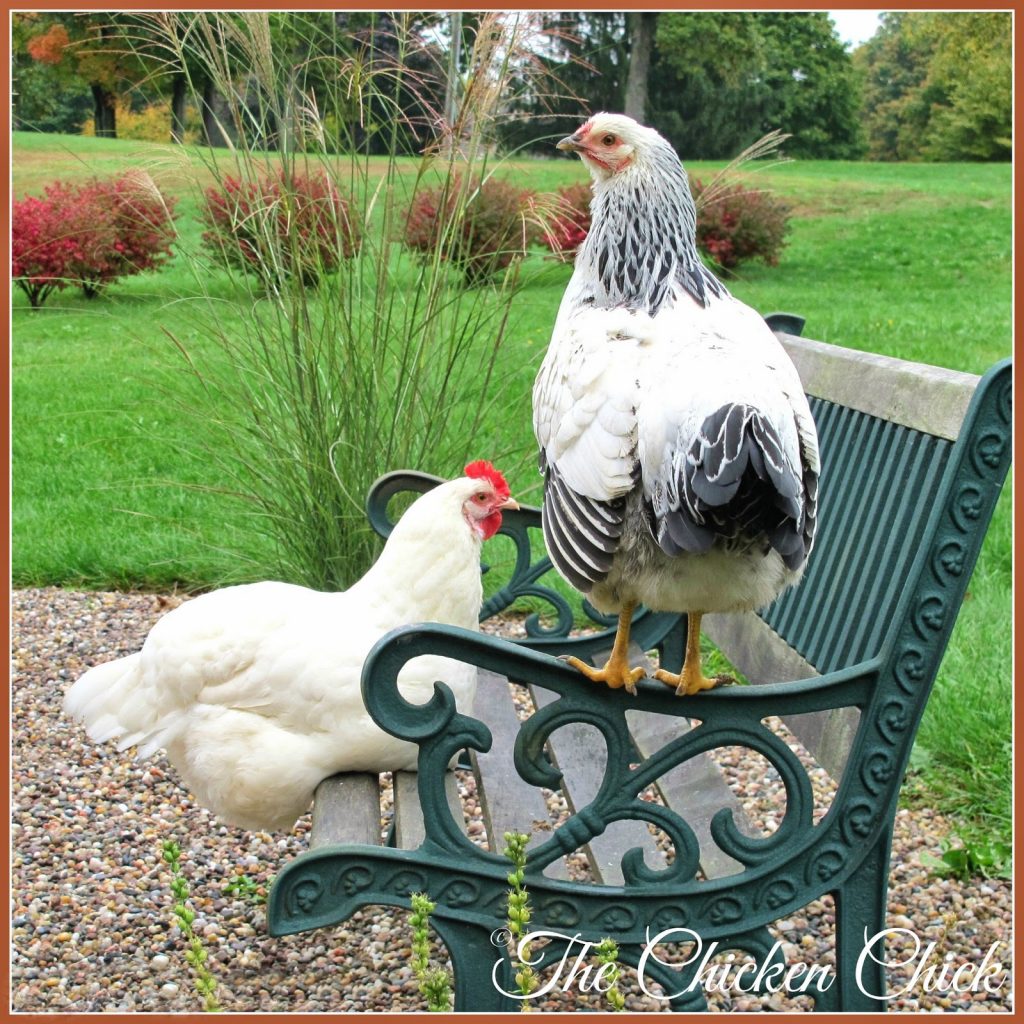
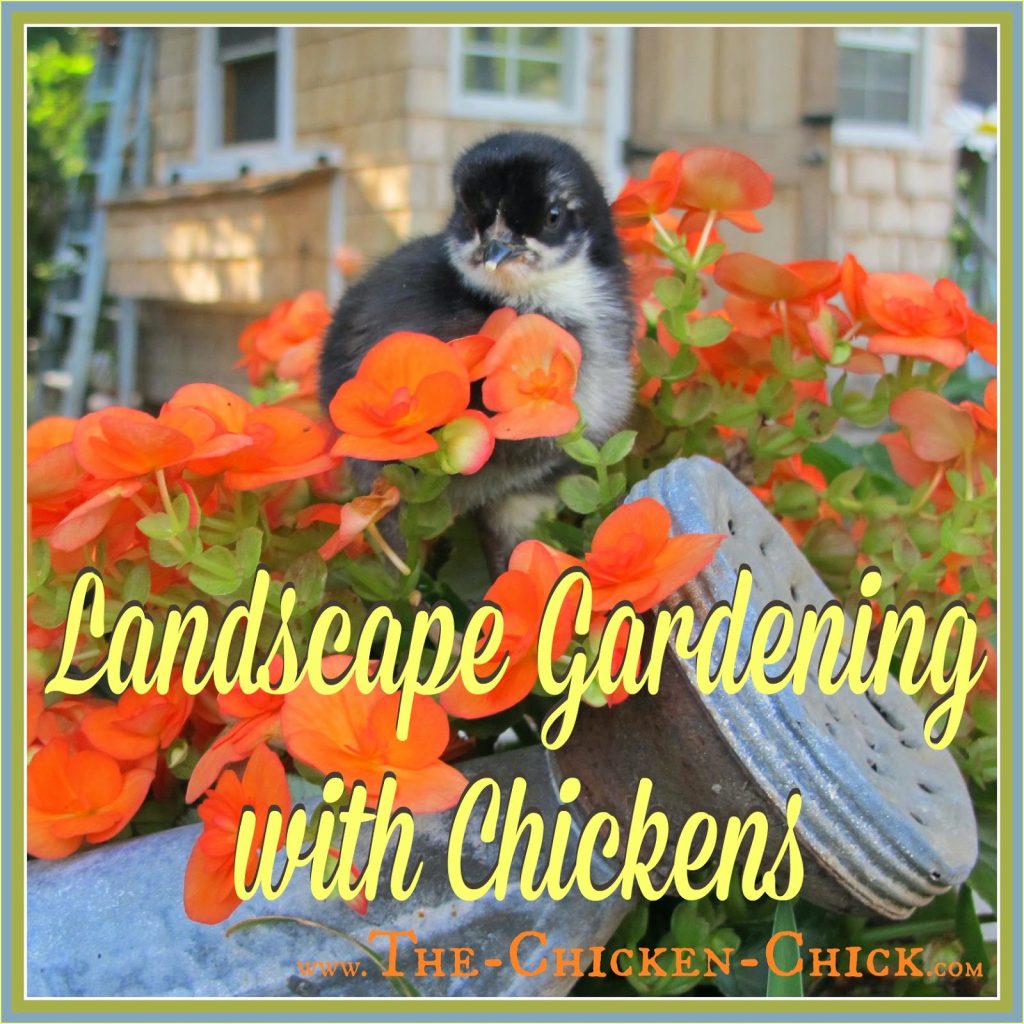















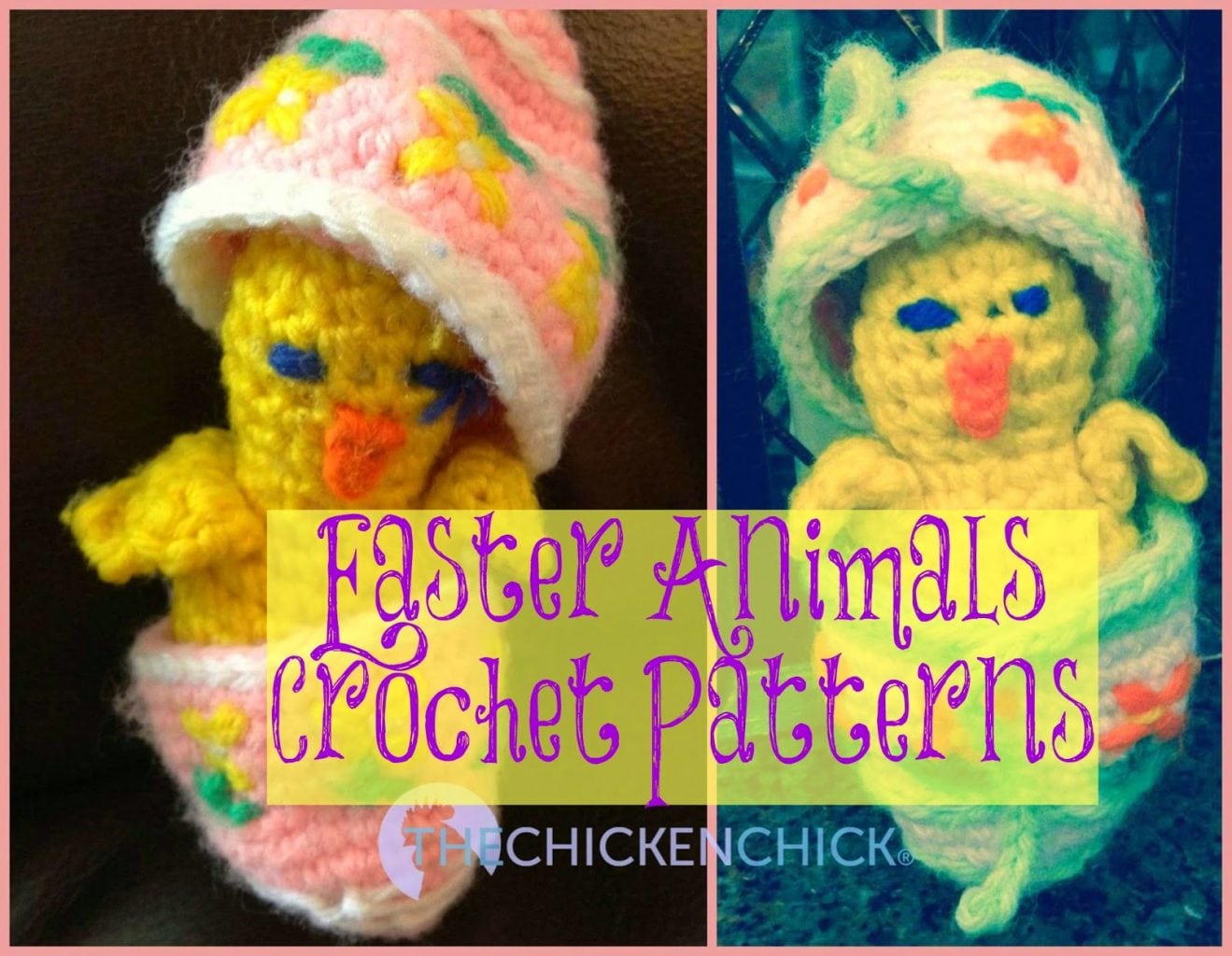






looks amazing!!!
Love your yard….only 7 chickens caused my mulch loving husband to go crazy…Will have to re think some of our hardscaping!
Would love the giveaway! my girls would be so excited!
Great tips! Thanks! and here's a tip for you: create an enticing dust bath area where it is easy to add ash, sand, and even Sevin to prevent mites. Helps keep the rest of the garden intact :)
Would love to own this feeder! Amazing how I was wanting to learn about gardening with chickens and to my surprise that was what your blog was about today!! Thank you for the advice!
Thanks so much i think I may be brave enough to plant more now.